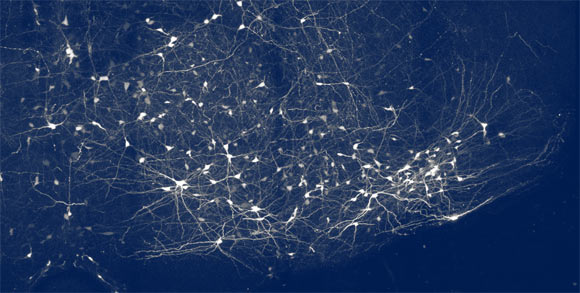A research team led by Florey Institute of Neuroscience & Mental Health and Macquarie University scientists has discovered a group of cells in the brain that may function as a ‘master-controller’ for the cardiovascular system. The discovery may pinpoint where cardiovascular issues such as high blood pressure and heart failure are controlled in the brain.

Farmer et al used genetic techniques to make glowing brain cells or rendered them sensitive to laser light to alter their activity; these brain cells are now thought to coordinate activity across the cardiovascular system. Image credit: Farmer et al, doi: 10.1113/JP277661.
“Our study reveals how the brain directs blood flow to different parts of the body, a finding which has puzzled neuroscientists for many years,” said Macquarie University’s Dr. Simon McMullan, co-lead author of the study.
Using genetically modified viruses in a rat model, Dr. McMullan and colleagues were able to make brain cells that govern blood flow glow under the microscope.
This allowed them to trace, for the first time, the cells’ connections to multiple parts of the cardiovascular system.
The researchers identified one critical group of cells in the most evolutionarily ancient part of the brain, the medulla oblongata, that send connections to multiple cardiovascular targets, suggesting a preeminent role for these cells.
In a follow-up study, they rendered those same brain cells sensitive to laser light, a technique called optogenetics, allowing them to control their activity with the flick of a switch.
The brain cells were found to simultaneously exert influence on multiple regions of the body, including the heart and the blood vessels of the fore- and hindlimbs, suggesting that the function of these cells is to coordinate activity across the cardiovascular system as a whole.
“We found that brain cells broadcast their message to many different targets to co-ordinate global control of blood flow,” Dr. McMullan said.
“The brain’s control over your heart and blood vessels is essential for your survival. Even doing something as simple as going from lying down to a sitting up position can cause huge shifts in blood flow that, if left unchecked, could threaten your ability to stay conscious, and therefore, alive.”
“The body needs to orchestrate competing demands for blood from different tissues at different times,” said co-lead author Professor Robin McAllen, from the Florey Institute of Neuroscience & Mental Health at the University of Melbourne.
“We have discovered master controllers of the cardiovascular system that regulate the heart and blood vessels at the same time.”
The discovery is described in a paper published in the Journal of Physiology.
_____
David G.S. Farmer et al. On the presence and functional significance of sympathetic premotor neurons with collateralised spinal axons in the rat. Journal of Physiology, published online May 11, 2019; doi: 10.1113/JP277661







